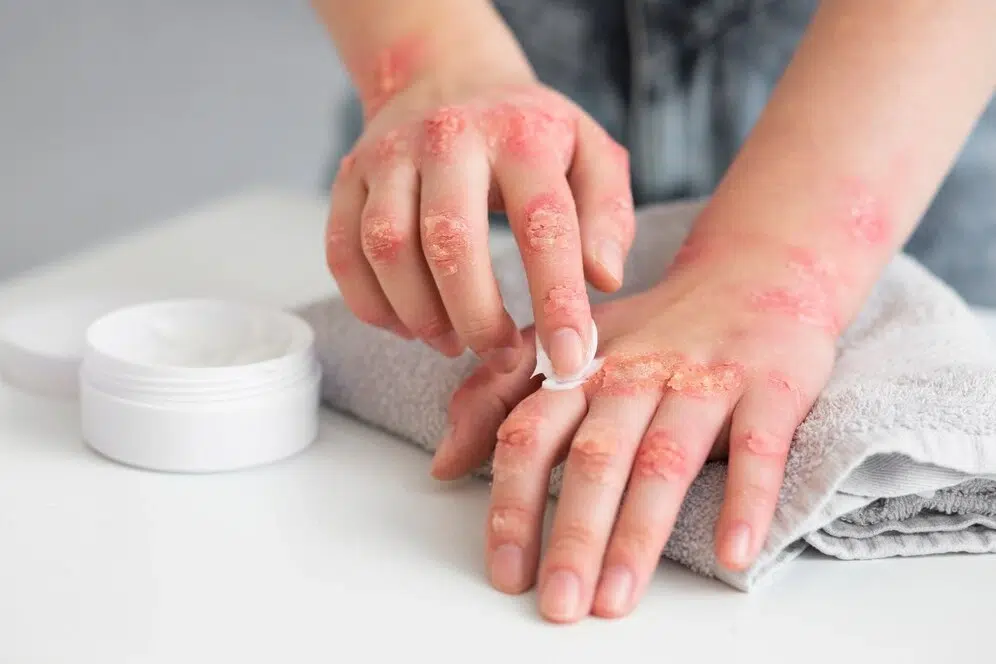Understanding Eczema: Causes, Symptoms, and Treatments

Eczema, also known as dermatitis, is a dry skin condition that affects millions of people in the UK. Eczema is characterised by dry, itchy, red patches of skin. Eczema can be irritating and difficult to manage. Although it mostly occurs on the face as well as the elbows, knees, hands, and feet, it can appear anywhere on the body.
Although it’s common, eczema is not contagious, so you can’t catch it from someone else. But because it is chronic, it can have sporadic flare-ups, requiring constant maintenance.
In this blog, let’s dig into exactly what eczema is, the types of eczema, what causes it, its symptoms, and the best treatments to help bring you relief and keep eczema at bay.
Types of Eczema
Eczema is not just one thing — rather, it’s a group of conditions, each with unique features.
1. Atopic Dermatitis
The most common kind, atopic dermatitis, usually begins in childhood. Most kids grow out of it, but some still have symptoms in adulthood. It is closely related to asthma and hay fever, constituting what doctors refer to as the “atopic triad”.
2. Other Types of Eczema
- Contact Dermatitis – Where skin is touched by an irritant (such as soap or chemicals) or an allergen (like nickel or latex).
- Dyshidrotic Eczema – Causes tiny, itchy blisters on palms and soles of the feet that emotional stress or allergies tends to set off.
- Nummular Eczema – Coin-shaped patches that often occur on the arms and legs.
- Seborrhoeic Dermatitis – Affects skin in oily patches, like the scalp (dandruff) and face.
- Stasis Dermatitis – Is caused by impaired blood flow, generally in the lower legs.
It’s important to know which one you have so you can control it.
Causes and Risk Factors
Although the exact cause of eczema is uncertain, environmental and genetic factors have been implicated.
Key Contributors:
- Genetics – Individuals are at higher risk if they have a family history of eczema, asthma, or hay fever.
- Overactive Immune System – Your body is excessive in defending you against irritants, which leads to inflammation.
- Impaired Skin Barrier – When the skin barrier is damaged, there is an excessive loss of moisture and an easy way for germs to enter.
Common Triggers:
- Irritants – Strong detergents, soaps, and synthetic textiles.
- Stress – Emotional stress can also aggravate flare-ups.
- Allergies – Pollen, animal fur, dust mites, some foods (such as dairy, nuts).
- Weather – Cold, dry weather or sweating can make it worse.
Symptoms of Eczema
Signs and symptoms of eczema are individual; however, common ones include:
- Dry, itchy skin – The most common, ongoing complaint.
- Redness and swelling – Red patches can be hot to the touch.
- Crusting or weeping – Scratching can ultimately cause infections.
The Itch-Scratch Cycle
- Scratching feels good initially, but it causes even more skin damage, which results in more inflammation and more itching – a killer cycle for anyone with eczema.
Chronic Nature
- Periodic flare-ups of symptoms and remissions (clear skin) are characteristics of eczema. Knowing your triggers can aid in preventing flare-ups.
Diagnosing Eczema
Eczema is diagnosed by dermatologists by:
- Inspection – Visually inspect the condition of the skin and the areas involved.
- Review of Medical History – Family history, allergies, prior flare-ups.
- Patch Testing – When contact dermatitis is suspected, the allergen is tested on the skin.
Early diagnosis is invaluable for planning an appropriate treatment.
Treatment Options
Although eczema cannot be cured, numerous therapies can help control its symptoms.
1. Topical Treatments
- Emollients (moisturisers) – Essential for repairing the skin’s protective layer (e.g., Cetraben, E45).
- Corticosteroid creams – Control inflammation of the red areas when they flare up.
2. Oral Medications
- Antihistamines – They can reduce itching at night.
- Immunosuppressants – Used in serious cases to turn down an over-the-top immune response.
3. Light Therapy (Phototherapy)
- In stubborn eczema, controlled UV light exposure can help reduce inflammation.
4. Lifestyle and Home Remedies
- Careful Skin Care – Apply fragrance-free, hypoallergenic skincare products.
- Cotton Clothing – Stay away from wool or synthetic fabrics because they irritate the skin.
- Tepid Baths – Hot water dries out the skin more.
Preventing Eczema Flare-ups
Prevention is the best way to keep your eczema under control in the long term.
Avoid Irritants
- Choose mild, soap-free cleansers.
- Use gloves when touching chemicals.
Manage Stress
- Relax; try some stress-reduction techniques such as yoga or meditation.
Control Allergens
- Use dust mite-proof bedding.
- For allergy sufferers, keep pets out of bedrooms.
Maintain Skin Hydration
- Moisturise after having a bath.
- Consider a humidifier during dry months.
Living with Eczema
Eczema isn’t just a physical ailment either; it can also penetrate the mental and emotional sphere, creating stress and self-consciousness.
Daily Management Tips:
- Be consistent – Keep a skincare ritual, keeping in mind that it can avoid these pesky flare-ups.
- Short nails – Decreases skin damage due to scratching.
- Find support – An online community or support group can be helpful.
When to See a Specialist
See a dermatologist if you have:
- Severe itching or pain.
- Infection signs (pus, fever).
- No change with OTC remedies.
A specialist may be able to offer treatments such as immunomodulators or individualised treatment plans.
Conclusion
Eczema is a long-term condition, but the symptoms can be managed. By knowing your triggers, sticking to a skincare routine that suits your skin, and getting medical help when necessary, flare-ups can be kept to a minimum.
At Chase Lodge Hospital, our dermatologists are committed to helping you to have healthier, more comfortable skin. If eczema is interfering with your quality of life, seek out expert care!
Clearer skin is achievable with the right method.